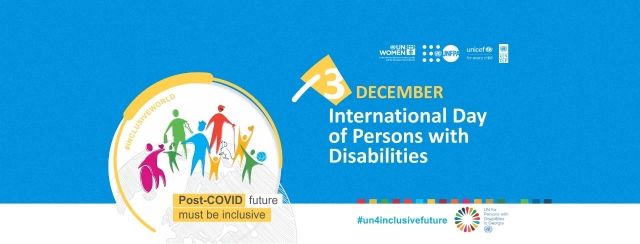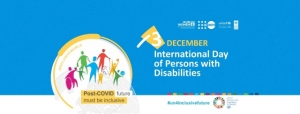An Inclusive Society is Key to a Robust COVID-19 Recovery
On the International Day of Persons with Disabilities, the United Nations Development Programme (UNDP) reiterates its strong commitment to assist Georgia in building an inclusive society in which all citizens, without exception, can exercise their fundamental human rights, enjoy equal access to public services and participate fully in the life of their communities.
Persons with disabilities form a sizable share of any society. Only 3 percent of the Georgian population is officially registered as having a disability, but the actual share is estimated at around 15 percent. Long stigmatized and pushed into the shadows, persons with disabilities are gaining voice and agency.
Georgia has made strong legal commitments to protect the rights of persons with disabilities. The country ratified the landmark UN Convention on disability in 2014 and passed a long-awaited national Law on the Rights of Persons with Disabilities in July 2020. This legislation reflects a shift from the “medical model,” which views disability as an illness to be treated, to the “social model,” which shifts responsibility to societies to find ways to accommodate the needs of persons with disabilities.
“Promoting inclusion for persons with disabilities means recognizing and protecting their rights,” said the UN Secretary-General Antonio Guterres in a statement for the International Day. “These rights touch on every aspect of life: the right to go to school, to live in one’s community, to access health care, to start a family, to engage in political participation, to be able to play sport, to travel – and to have decent work.”
The Georgian public is increasingly recognizing these rights. As documented in new UNDP research, large majorities of Georgians agree that persons with physical disabilities can perform well in education and employment and as decision-makers at all levels, for example in the Parliament. Unfortunately, acceptance drops dramatically for persons with mental or intellectual disabilities. Less than half would want someone with a mental or intellectual impairment as a co-worker, neighbor or classmate to their children. Most believe people with mental disabilities should not have children.
“We salute Georgia for its commitment to full social inclusion,” said UNDP Head Louisa Vinton. “But there is still a long way to go to translate this resolve into tangible improvements in the lives of persons with disabilities. COVID-19 has thrown up new obstacles on this road, and we call on the authorities and citizens alike to ensure that the pandemic does not put persons with disabilities into jeopardy. At UNDP, we strongly believe that a more inclusive society will see a swifter post-COVID recovery.”
UNDP has been helping to protect disability rights in Georgia for more than a decade. This work has included ensuring that persons with disabilities have access to public spaces such as the Public Service Hall and the Parliament and can make full use of public services. This effort has intensified during the pandemic. UNDP helped to customize COVID-19 information for persons with disabilities; ensured that all Government briefings were translated into sign language; provided online counselling and peer-to-peer support to staff and residents of institutions for persons with mental disability; and delivered care packages and provided home care to thousands of elderly people, many of whom have disabilities.












